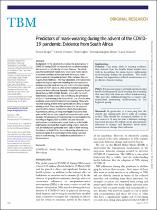Predictors of mask-wearing during the advent of the COVID-19 pandemic: Evidence from South Africa

View/
Date
2022Author
Burger, Ronelle
English, Rene
Maughan-Brown, Brendan
Christian, Carmen
Metadata
Show full item recordAbstract
Background: In the absence of a vaccine, the global spread of
COVID-19 during 2020 has necessitated non-pharmaceutical
interventions to curb the rise of cases. Purpose: The article
uses the health belief model and a novel rapid mobile survey
to examine correlates of reported mask-wearing as a nonpharmaceutical
intervention in South Africa between May and
August 2020. Methods: Two-way tabulations and multivariable
analysis via logistic regression modeling describe correlations
between reported mask-wearing and factors of interest among
a sample of 7074 adults in a two-period national longitudinal
survey, the National Income Dynamics Study-Coronavirus Rapid
Mobile Survey (NIDS-CRAM). Results: In line with the health
belief model, results showed that self-efficacy, the prevalence
of others’ mask-wearing in the same district, and affluence were
positively associated with reported mask-wearing. Those who
reported staying at home were significantly less likely to report
wearing a mask. There was little evidence that the expected
severity of the disease if contracted, affects these decisions.
Hypertension, obesity, or being overweight (measured three
years earlier) did not have a significant association with maskwearing.
The prevalence of mask-wearing increased significantly
from May to August 2020 as COVID-19 cases increased
and lockdown restrictions were eased. Contrary to the health
belief model, we found that despite having a higher mortality
risk, the elderly had significantly lower odds of mask-wearing.
Conclusion: In South Africa, the mask-wearing adherence has
increased rapidly. It is concerning that the elderly had lower
odds of mask-wearing. This should be examined further in
future research.
